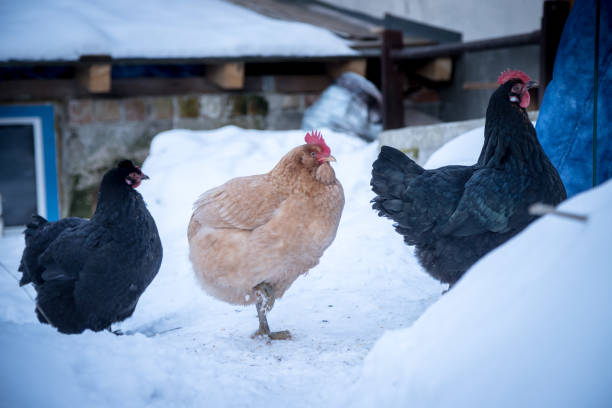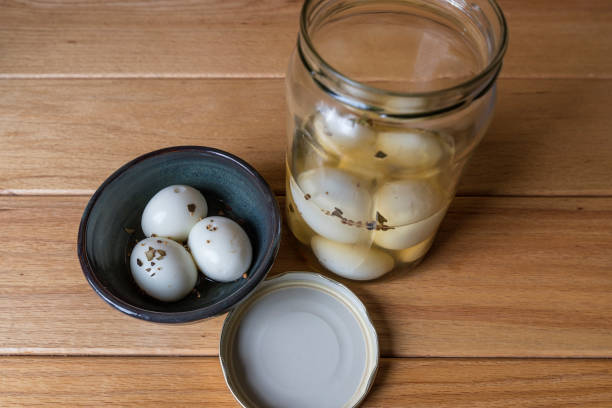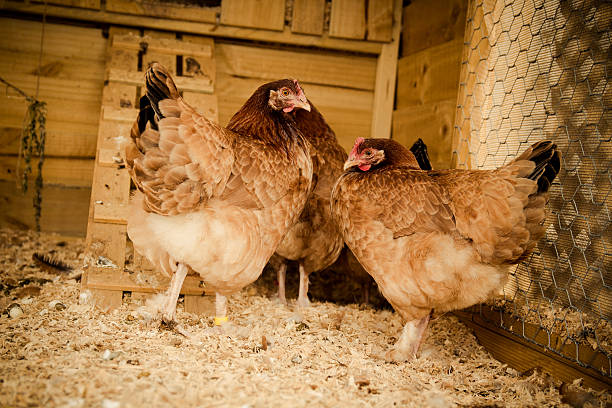As winter approaches, it’s essential to choose chicken breeds that can withstand the cold. Cold-hardy chickens are not only more comfortable during frigid months but also continue to lay eggs and stay healthy. Here’s a guide to the top seven cold weather chicken breeds, along with tips for keeping less tolerant breeds comfortable and thriving.

1. Cold-Hardy Breed Features
Cold-hardy chickens often have specific traits that enable them to thrive in low temperatures:
- Dense Feathering: A thick layer of feathers provides insulation.
- Smaller Comb: Breeds with smaller combs are less susceptible to frostbite.
- Body Size: Heavier breeds retain heat better due to their mass.
Some of the best cold-hardy breeds include:
- Plymouth Rock: Known for its friendly nature and reliable egg production.
- Rhode Island Red: Hardy and resilient, they are excellent foragers and prolific layers.
- Orpington: Large and gentle, they are known for their adaptability and consistent egg laying.
- Australorp: Known for its egg production and hardiness in harsh climates.
- Cochin: These fluffy birds provide excellent insulation with their dense feathering.
- Wyandotte: With their attractive plumage, they are not only beautiful but also hardy.
- Sussex: Known for their versatility and ability to thrive in cold conditions.
2. Which Breed Lays More Eggs in Winter?
When winter rolls around, many chicken keepers worry about their hens’ egg production. If you want to ensure a steady supply of eggs despite the chilly weather, look no further than some of these winter-laying champions!

Australorps are another stellar option. Known for their excellent temperament and adaptability, these chickens are also prolific layers, contributing around 250-300 eggs annually. Their ability to lay consistently even in colder months makes them a favorite among many chicken enthusiasts.

Plymouth Rocks add variety and charm to your flock, while also being reliable layers. These hardy hens can produce about 200-250 brown eggs a year. Their friendly nature and beautiful feather patterns make them a delightful addition to your winter coop.

By choosing these breeds, you can keep your egg basket full throughout the colder months, ensuring you never run out of those delicious, fresh eggs!
3. Caring for Less Cold-Tolerant Chickens
For those breeds that are less cold-hardy, several measures can be taken to ensure their comfort:
- Insulation: Proper insulation in the chicken coop can help retain warmth. Use materials like foam board or straw bales to insulate walls.
- Deep Litter Method: This method involves layering bedding materials (like straw or wood shavings) that decompose and produce heat as they break down.
- Roosts and Nesting Boxes: Provide elevated roosts and insulated nesting boxes to keep chickens off cold ground and protected from drafts.
When extreme cold hits, consider using the Chickcozy Coop Heater for those sick, old, or less cold-tolerant chickens. This heater creates a warm spot in the coop, providing a safe retreat without heating the entire space.

4. Essential Winter Care
Even cold-hardy breeds need an appropriate shelter to stay safe from the elements. Ensure your coop is well-built, insulated, and free from drafts. Regularly check their water supply, as it can freeze quickly in cold weather. Providing a continual supply of fresh drinking water is crucial for hydration.
An extra tip: offering a small amount of corn in the afternoon can help generate internal warmth as your chickens digest it overnight.
Also, keep an eye on chickens with feathered feet, as they are particularly prone to frostbite. Regularly check their feet to ensure they aren’t wet or dirty.
Conclusion
Choosing the right cold weather chicken breeds and implementing proper care strategies will keep your flock healthy and happy throughout the winter months. With the right preparation and the help of products like the Chickcozy Coop Heater, even the less cold-tolerant chickens can thrive. Keep those feathers warm, and enjoy the beauty of winter with your clucking companions!



Leave a comment
All comments are moderated before being published.
This site is protected by hCaptcha and the hCaptcha Privacy Policy and Terms of Service apply.